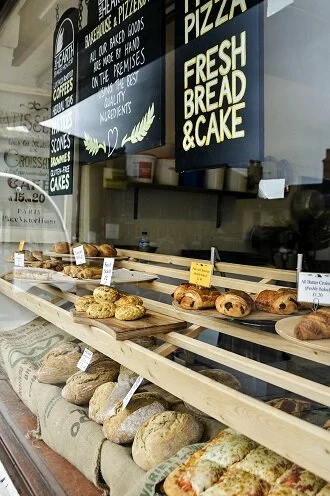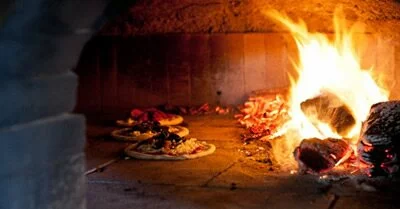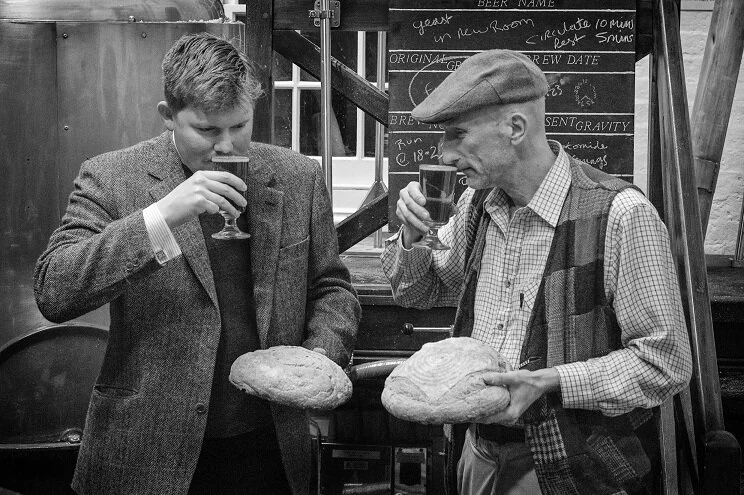This week I met a baker in Lewes who makes the most medieval bread I’ve ever tried. Amazing pizza too, baked in a hand-built wood-fired oven in a very down to earth bakehouse above a bus station.
‘Medieval’ may be misleading though. It perhaps isn’t the ideal description for the freshly baked, warm loaves of bread that I walked away from Lewes with yesterday. One was seeded, both had amazing flavour and texture. Each looked as if they’d been torn at by starving medieval waifs by the time I got home. Lovely as they were with my home-made soup for supper, I obviously couldn’t resist tearing hunks out of the bread while it was still warm on my train journey home.
Sipping excellent coffee from the kiosk outside The Hearth when I arrived, I admired the rustic grissini, loaves of sourdough bread and slices of Sicilian style pizza that surely must offer irresistible temptation to passers-by.
The take-away menu isn’t that of the average pizzeria; the pizzas range from Iberian (with organic chorizo and Majorcan sobrasado) to funghi (with local blue cheese) while Middle Eastern flatbread is on offer, served with a spicy Muhamara spread (spicy Syrian walnut paste – determined to make this to go with my own flatbread!) and local lamb, slow-cooked in the falling heat of the pizza oven is often on offer.
Back to the medieval bread though, I was introduced to Michael Hanson by John Letts, an archeobotanist who is also pretty handy at farming. He grows heritage wheat land-race style, with many different types of hardy grain growing together in one field, the way we used to do it before we became obsessed with monoculture, high yielding modern varieties of grain and bland, pappy white bread with a high gluten content. I wrote about John’s grain and the tasty flour it produces, as well as the potential health and environmental benefits here.
Michael is a third generation baker, who spent his early working life in the family bakery and was baking artisan bread before it was fashionable. Partly through his good friend, Dan Lepard, Michael worked at some of London’s finest bakeries and pizzerias, such as Franco Manca and St John’s Bread and Wine. Passionate about ‘honest bread’ made with real ingredients, Michael also learnt how to make earth ovens and tours the UK festival circuit with a pizza oven.
He calls his bakery/eatery in Lewes a “hostelry with a hearth or osteria” and I can see his point; the home-made bread/pizza oven creates a great, warm atmosphere as well as amazing pizza and the simple, down to earth decor with emphasis all on the food reminds me of the sort of places you normally find in Italy or Spain.
The hearth is being used to create the sort of ‘honest’ bread that would’ve been eaten in a medieval hostelry. Michael is using ingredients that were commonly used to bake and leaven bread with until about 150 years ago – heritage flour (from John Letts) and wild yeast in the form of barm from the brewery they were usually next door to. In this case, the brewery is very traditional, family-owned, producing award-winning ales and can be seen from the bread oven.
There’s something beautifully satisfying about this bread-making process, which makes excellent use of rivet wheat (originally grown in Sussex, brought over by the Normans), has a minimum of 12 hours fermentation, used barm from the local brewery and is baked in an oven that’s handmade by the baker. At a time when many people are beginning to tire of industrially produced, plastic wrapped bread that provides little nourishment for the body or soul, this is wholesome, satisfying bread to be companionably shared with friends at home or in Michael’s canteen style bakehouse.
Michael has some interesting views on bread as a “ferment for social change” that I’ll write about in more detail soon. In the meantime he gave me some great tips for baking good bread (he also teaches bread-making at the Brook Bakery School in Somerset) that I’ll share.
Apart from using great flour, Michael emphasizes that good bread needs time: “You need to leave it to prove for 5 hours minimum to make a half-decent loaf of bread, 5-10 hours for a fantastic loaf.” While I chatted to Michael at 2.30pm in the afternoon, the dough was already starting to prove ready for baking at 9am the following morning. He says that it won’t over-prove if you use less yeast – use a quarter of the amount of yeast you’d normally use if you’re opting for a long prove.
Secondly, temperature is vital during this long prove. I asked about leaving dough in the fridge and also admitted that I sometimes make dough on an evening and leave it on a cool bedroom windowsill ready for baking in the morning on a weekend. My dough behind the curtains may be okay but it seems I need to invest in a decent food thermometer/probe. Keeping the temperature low is as important as low yeast levels for a long prove apparently, but not too cold – Michael recommends 19 degrees is perfect.
In the meantime, I’m enjoying the leftover bread toasted and the tasty amount of rye flour in one of the loaves goes perfectly with smoked trout in my view (it reminds me of some of the quite dense, full of flavour, Nordic loaves I’ve tried from Trine Hahnemann recipes). I’m dreaming of those thin-crusted pizzas and only wish The Hearth were closer to home. Suppose I’d better get baking instead.





Great post Andrea, and I’m already looking forward to the future post you’ve promised… We have some very good bakeries locally, but I’ve not come across anything like this one. Lewes is too far for a day trip from Yorkshire – looks like I’ll be needing to organise a holiday to the south coast very soon!
It’s a really interesting bake-house and so glad I went, even though it was too far for me too really. I’m writing an article on Michael, so I could justify the trip and it was good to see Lewes too – hadn’t been before and it’s a lovely little town. The surrounding countryside looked worth exploring too.
I’m sold – I’ve been buying St. John bread for years and the Franco Manca bread and pizzas are similarly excellent!
How brilliant having such good bread baked local to you.. I often resort to trying to make it myself but my visit to The Hearth has made me realise quite how much I need to learn/improve in my rustic efforts!
It must have been a great trip, the pizA & bread both sound heavenly…need to plan a trip there soon!
The bread and pizza are excellent, would love to try the lamb too – wishing again it was a bit nearer to us.
Bread heroes – we need more people like this to fight against the obsession “with monoculture, high yielding modern varieties of grain and bland, pappy white bread with a high gluten content. ” A return to honest food that actually tastes of something. Lovely article
Thanks Sally, glad to see someone else appreciates a bread hero!